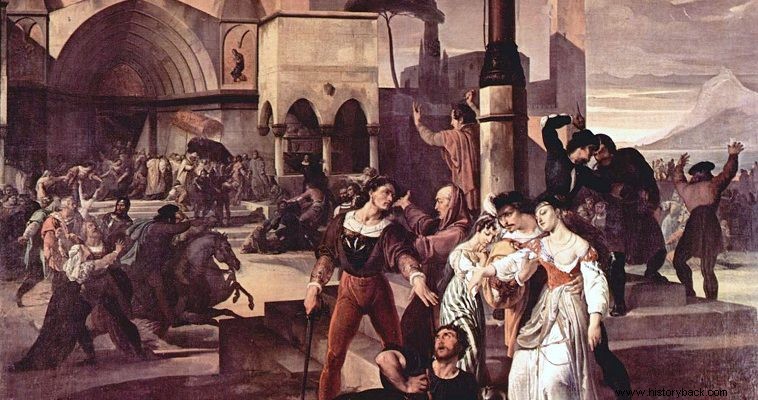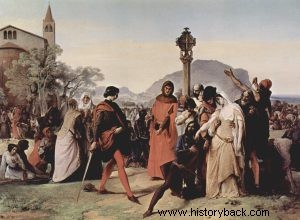
The Sicilian Vespers, the revolution of the Sicilian people against their French d'Anjou overlords, that is, was one of the most important events in history while there was also Greek involvement.
The rebellion broke out at Easter 1282 against the French who had occupied the island since 1266. The rebellion lasted six weeks and during it thousands of French were slaughtered, shaking the rule of the d'Anjou.
Charles of Anjou ruled Sicily after the Hohenstaufen Germans were defeated by the pope and his allies. However, the ambitious Charles considered Sicily as a base for the occupation of the Byzantine Empire which had recently recovered Constantinople and was ruled by Michael VIII Palaiologos.
Charles drained Sicily of all resources for his war against Byzantium. At the same time, he completely sidelined the locals from governance, alienating them. Michael Paleologos took advantage of this and with his agents on the island he made sure to incite the fire and make it flare up.
Besides, Charles d'Anjou had another powerful enemy, King Peter of Aragon, who considered Sicily his possession as his wife was a member of the Hohenstaufen family and a legal heir.
Rebellion breaks out
On the afternoon of March 30, 1282, the bell of the Church of the Holy Spirit in Palermo rang out vespers, giving the signal for the uprising. The occasion was the rape of a local married girl by a drunken French soldier, Duet.
Her husband attacked Drouet and killed him with a knife. Other French soldiers attacked the husband but the Sicilians attacked them and killed them all. Immediately the plan of rebellion was put into action. The bells of all the churches began to ring and under the guidance of agents the Sicilians poured into the streets shouting "death to the French".
The Sicilians broke into inns and lodges where the French and their families lived and slaughtered men, women and children indiscriminately. They even slaughtered local women who had married Frenchmen and even French priests and monks.
By morning about 2,000 Frenchmen had been massacred and the rebels were in complete control of the city.
According to another source the rebellion started when French soldiers under the pretext of looking for weapons seized the secrets of Sicilian women. Another source describes the events with Drouet, but mentions that the rebellion was caused by the agent of Michael Palaiologos, Ioannis Procindas.
The rebellion expands and dominates
After the revolution prevailed in Palermo the rebellion gradually spread throughout the island before the French could react. Within the next six weeks all of Sicily was controlled by the rebels except Messina which was well fortified.
Finally, this city also fell from within on April 28, and the rebels actually set fire to the French fleet anchored there, crushing the dreams of Charles d'Anjou to destroy the Byzantine Empire.
It is worth noting that one of the leaders of the rebellion in the old Greek colony was Bartholomew of Neokastro. He informed the Greek emperor Michael with a Genoese sailor who sailed to the City.
At the same time, the revolutionaries asked Pope Martin to recognize them and become their sovereign. But the French pope refused. This was also the final error of the French. So the Sicilians turned to Peter of Aragon and asked for his protection. Peter of course accepted and on August 30, 1282 he landed in Trapani.
Peter arrived at Palermo on September 2 and promised the Sicilians that he would respect their customs by winning them over. On September 4 he was crowned king as Peter I of Sicily. Charles attempted to react and tried to recapture the "gateway" of Sicily, Messina, but failed.
It is worth noting that Michael Palaiologos wrote about this:"I dare to boast that I was the instrument of God who brought freedom to the Sicilians...". The Byzantine gold helped to plan the revolt which of course was carried out by the Sicilians, many of whom had Greek roots.

The episode with the woman and Drouet.
